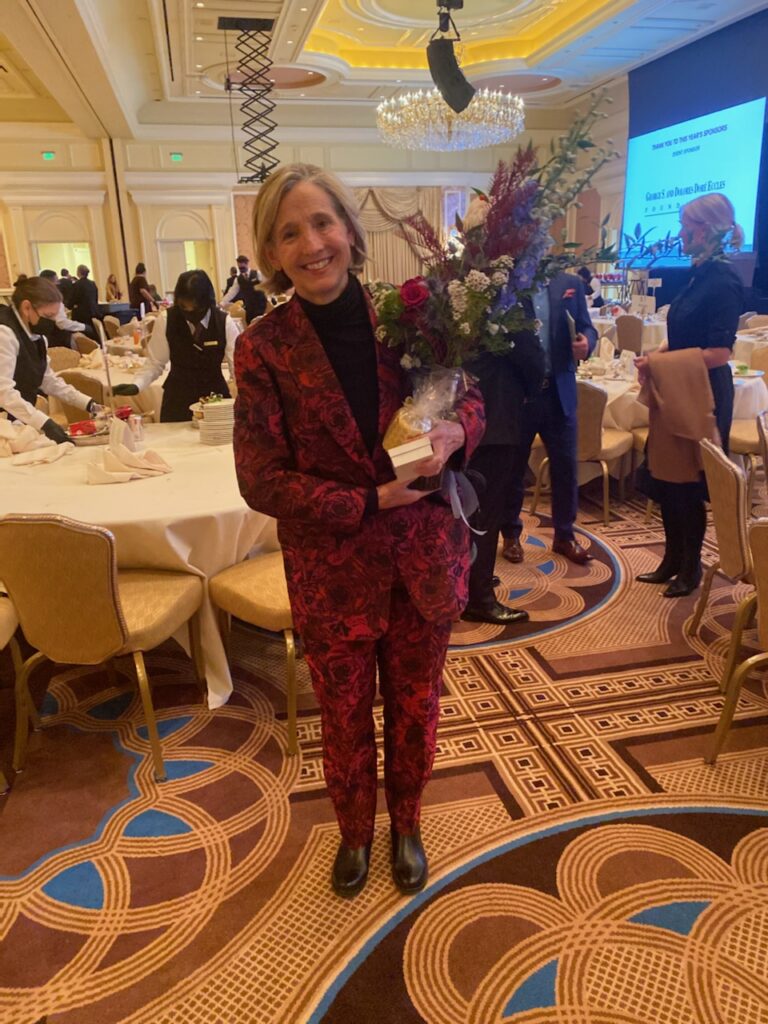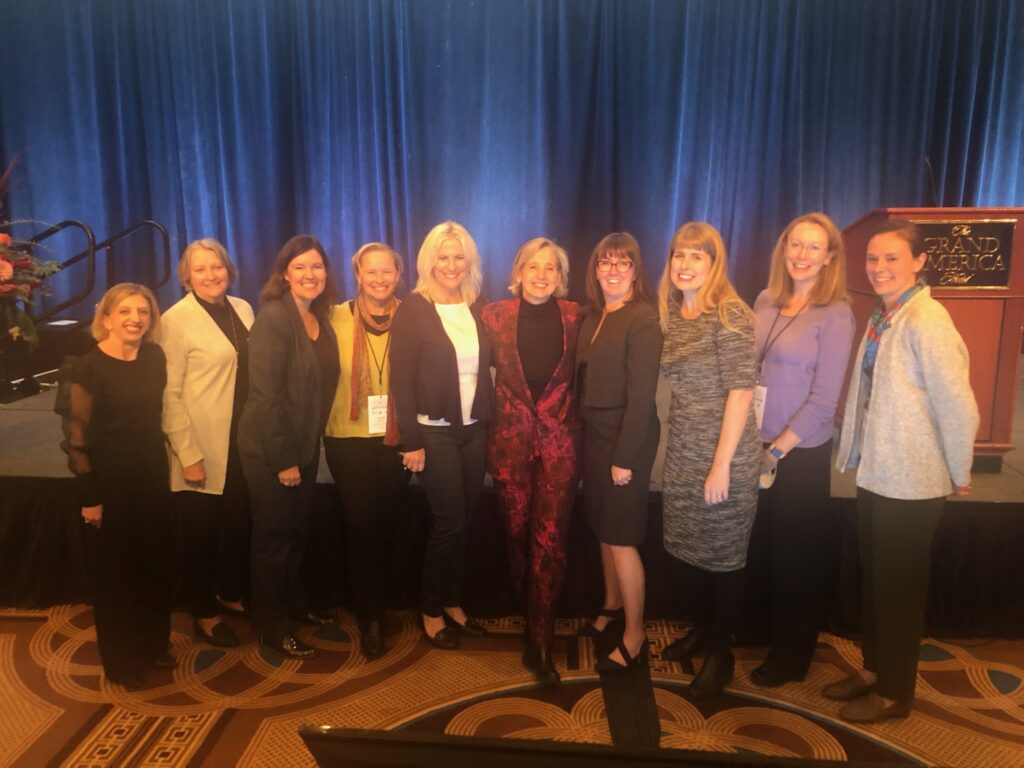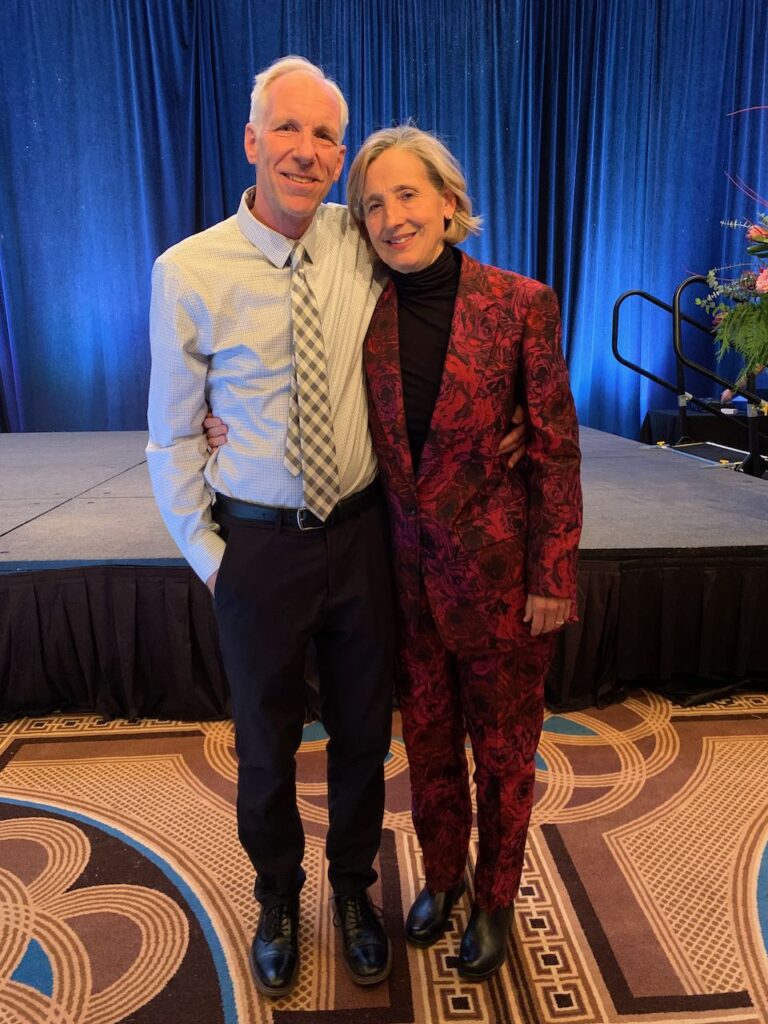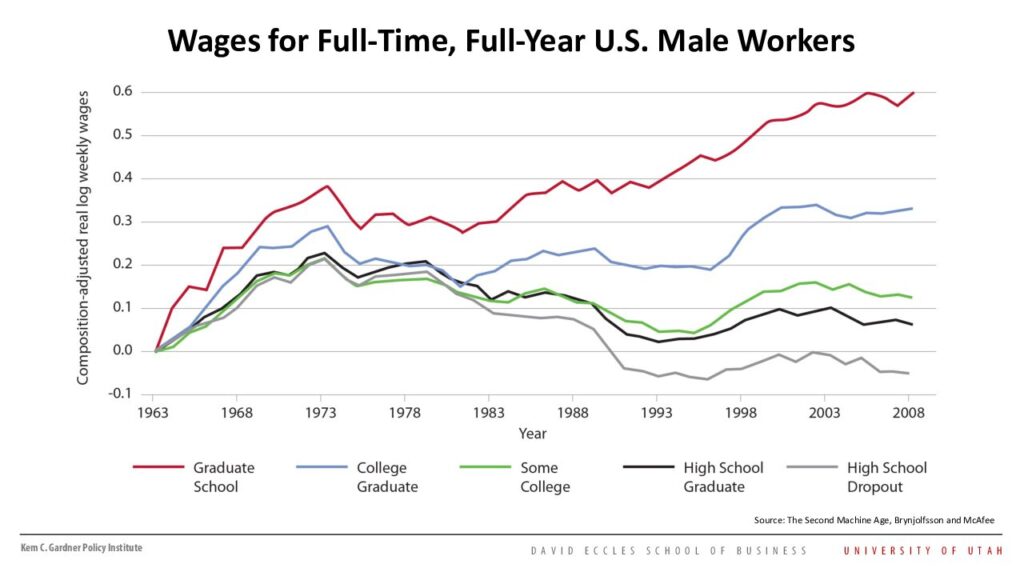Note: These remarks were given at the Salt Lake Chamber’s 2021 Utah Women and Business Conference .

I want to thank the Salt Lake Chamber – Gary Porter, Derek Miller, Heidi Walker, the Board of Governors, and Utah business leaders – for this honor.
I also want to thank my fellow Athenas, especially Molly, Linda, Chris, Deborah, Pat, and Peggy, for their support. Molly and Linda even helped pick my outfit today!
And please lend your applause to the women from the amazing team at the Kem C. Gardner Policy Institute who are here to support me today…will you please stand and be recognized?

It’s customary at this event for the Athena to share her story. I’d be more comfortable sharing a Utah economic forecast…but I will do the best I can.
My family is my rock and my strength. My family includes the love of my life – Chris Gochnour. I wear Chris’ ring on my finger and carry his love in my heart.

I also have two amazing children – Rosie and Theo. Together, with their loved ones, Jake and Mike, we live a full life. Being a wife and a mother is by far the greatest blessing in my life. Thank you for being here today!
I also come from a wonderful extended family – the Gochnours are marvelous people and I’m proud to carry their name, even though it’s difficult to say and spell.
My parents, Merritt and Marcia Egan, both passed away many years ago. But, in addition to the love they offered me, they left me with 10 older siblings to emulate and love.
That’s right…I’m the youngest of 11 children. And, above everything else it’s where my story begins.
As the youngest of 11, I had no choice, but to find my own voice in life.
- If you wanted to be an artist…well we already had one…make it two.
- How about a 4.0 student? We had a few of them too.
- Beauty queen…yup, that’s my sister Heather.
- How about a terrific athlete? We had that too, although I made my mark on the soccer pitch too.
You see…with 10 siblings you really must chart your own course and find your own way.
My parents flooded me with love, set high standards, and then just let me go. This independence, coupled with love and a value framework, created in me a strong sense of self-worth and purpose. I felt capable and free to pursue my dreams.
My dreaming started early, but it was not the ordinary kind of dreaming. Influenced by a mother who frequently quoted Abe Lincoln, read me Anne Frank’s diary when I was in fourth grade, and Aleksandr Solzhenitsyn’s Gulag Archipelago in the sixth grade, I felt the call to public service.
Many people dream of what they can do independently; I dreamed, even at a young age, of what people could do collectively to improve the world. This call gathered momentum as a series of experiences left their mark on me.
My brother served in the Vietnam War. I remember the day he got his unfavorable draft number and the nervous mood felt in our home.
I remember my mother planting a tree the day he left for Vietnam.
I remember Walter Cronkite reporting the day’s death tolls…and I remember seeing the caskets emptied from the side of an aircraft.
Mostly, I remember waiting with excitement for my brother’s return.
At the same time, I remember the controversy the war created in our society. My family made a sacrifice, but our country didn’t seem to care.
The Vietnam War was the first major political event that I remember awakening my sense of public service and dislike for public discord.
I took note…and began my journey toward public service.
—
Flash forward…I’m in college now, and I was drawn early to the topic of economics. It wasn’t that I enjoyed supply and demand curves, but rather, I craved an understanding of how the world works and how to make it better.
Economics gave substance and order to the public feelings I cared about:
- How do we expand opportunity?
- How do we improve life quality?
- How do we make a more just and civil society?
- How do we form a more perfect union?
My commitment to the world of ideas and public service crystallized when I served a Hinckley Internship in Washington, D.C.
It was during this time that I saw the magic of Ronald Reagan’s White House. I also saw the bone-on-bone politics that makes Washington both infuriating and exhilarating.
It was in Washington, D.C. at a political gathering for Young Republicans where my political ideology took root. Mary Bradford – a writer, poet, editor, and social thinker – was the guest speaker.
A student asked Ms. Bradford if she was a liberal or a conservative. Without hesitating she answered by saying, “I believe in liberating ideas that are right and true and in conserving ideas that are right and true. That’s how we make the world a better place.” [REPEAT]
Her words resonated with me deeply. Even now these words are the north star for my professional life. It’s not liberal or conservative, left or right, Rs and Ds…it’s right and true. That’s the goal.
Inspired by her words, I returned to the University of Utah ready to turn up the speed and redouble my efforts to serve my community as a political moderate – someone who takes the right and true ideas from both sides of the aisle and puts them into action.
I finished an undergraduate and graduate degree in economics and then landed in the perfect place for my interests – the Utah governor’s office.
I worked for three amazing governors – Bangerter, Leavitt, and Walker.
The challenges were different, and the leaders were different, but the call to service was the same.
All three of them taught me how to do public service right – put people before politics, focus on problem solving over party, and make sure the public good trumps private gain…every time.
I’d like to share three brief stories about my service with each of these governors.
Bangerter – In the late 1980s, the Beehive State was struggling with a protracted recession while a huge wave of school children was entering our schools. During this period, we experienced seven consecutive years of net OUT migration, something that is almost unimaginable right now. As a reminder… we have now experienced net in-migration for 29 of the past 31 years.
Enrollment growth with no money to accommodate it is a bad equation. Making matters worse, California had passed Proposition 13, which was causing a tax revolt in Utah. I still remember the chants I heard from a large crowd in the Capitol shouting…“NO MORE TAXES, NO MORE TAXES.”
Lest you think this was the perfect storm of recession, enrollment growth, and tax revolts…it was also an election year.
Gov. Bangerter faced a choice – significantly underfund Utah’s school system in the face of unprecedented growth, or raise taxes and risk re-election. He chose to raise taxes.
Gov. Bangerter famously proclaimed upon making his decision to recommend a tax increase: “This may cost me the election, but I’m doing it for the kids.”
Oh, and by the way…he won re-election.
I took note.
Leavitt – Mike Leavitt distinguished himself in myriad ways. His willingness to place good policy over party was particularly evident in 2001 when, as a sitting governor with a 78% approval rating, he was loudly booed at his own convention. He was forced into a primary because of his stance on keeping guns out of churches and protecting Utah’s cherished red rock country.
As a Republican delegate and member of the governor’s staff at the time, I sat in the upper seats of the Maverick Center shaking my head as fellow Republicans missed the mark.
Sure, we can disagree about issues, but boo our governor for trying to keep people from packing heat when they go to church?
Boo our governor for trying to preserve Utah’s red rock wilderness…something that I loved?
It’s after this experience that Gov. Leavitt explained to me the backpack theory. He said each year in public service you get more rocks to carry in your backpack. The burden gets heavier and heavier, but you carry on.
- Veto a special-interest tax break … that’s a rock in the backpack.
- Preserve and earthquake proof our remarkable State Capitol when you could cut taxes…that’s a rock too.
- Work to find a balance between private property rights and the right to bear arms … another rock in the pack.
- Try to secure a sensible approach to BLM wilderness and monument designations … another rock.
Mike Leavitt collected these rocks while serving with distinction.
I took note…lots of notes…and proudly collected those rocks with him.
Walker – Gov. Walker helped lead welfare reform in our state. She applied her feminine values of compassion, empathy, and stewardship to the creation of the Utah Dept. of Workforce Services…a building that now bears her name.
During this time, I watched as she, in her role at lieutenant governor, went toe to toe with Gov. Leavitt over who would direct the new department. Would it be a business leader who knew how to count the money or a compassionate and empathetic leader who would know exactly how to lift people in our state who struggled.
Olene Walker persuaded Gov. Leavitt to select a servant leader.
Again, I took note.
—
Each of these governors taught me important lessons:
- Do the right thing, even when it’s hard.
- Stay clear of the dangers of extremism on the left or the right.
- Develop empathy in professional life…see people as people.
—
Now it wouldn’t be right for me to speak to you without sharing some data. Am I right?

This figure shows in mathematically adjusted terms the inflation-adjusted wages of U.S. men by level of education since the year I was born. (I could show you the same graph for women, but this one makes the point with more clarity). Each line color represents a different level of educational attainment.
What do we see?
In general, the graph shows the more education you receive the higher your wages. No surprise there.
But let’s break it down further. Look at the first ten years of the graph. In the late 1960s and early 1970s wages for all education levels were climbing. Everyone was able to participate in the American dream. This was progress.
Now look at the next decade –roughly 1972-1982 – those with higher education levels still made more, but the wages for all education levels basically moved sideways. Not great, but not decline.
Now look at 1982…something important starts to happen. Time Magazine designated the personal computer as person of the year. The information age began its crescendo and a fanning out of wages by education level started a decade’s long dispersion.
The world begins to look and feel very different for those with less education. Their work ethic and labor alone will not provide them with upward mobility.
The light of the information age casts a shadow as worker displacement, large and growing differences among people in income and wealth, and less upward mobility for some create social unrest.
This is the America we live in today.
The public policy question of our day is how we maximize the light, while mitigating the shadow of a world dominated by technology.
—
As you might guess…I have a few ideas! Call it a call-to-action if you will.
First, we have a lot of inner work to do. We must look inward and consider how our own actions affect the circumstances of others. Inner work requires us to consider the real-life experiences of others and do our part.
- It’s not okay that two out of every ten economically-disadvantaged students in this state do not graduate from high school. They are on a sure path to poverty.
- It’s not okay that only one in three economically-disadvantaged third graders can read at grade level. The other two will not participate in this state’s prosperity.
- It’s not okay that the poverty rate of black or African American Utahns is more than three times higher than the white population. They deserve a better life for their families.
We need to do the hard inner work that forces us to acknowledge these and other disparities and improve life outcomes for Utahns.
Second, we have some unlearning to do. By unlearning I mean we need to change thoughts, feelings, and behaviors that often do harm to our country, our communities, and our neighbors.
We need to unlearn behaviors that divide us at the expense of our treasured institutions – the White House, Congress, the Supreme Court, our voting systems, and yes…even the way we redistrict for political gain on both the left and the right.
Remember the mantra…liberate what is right and true and conserve what is right and true.
Whether it is “defund the police”, “eat the rich”, “fake news”, “alternative facts”, “let’s go Brandon” chants, bills nicknamed FAUCI, or any other number of divisive, counter-productive, sensationalized, and mean-spirited behaviors from both ideological extremes…we must change. We must “unlearn” these behaviors.
Finally, we need to sign a new social contract that inspires a greater willingness to listen, learn, show respect, and value people with different life experiences.
It’s an ethos that compels each of us to look at someone for whom we have differences. Listen to their perspective. Learn from their life experiences. Respect them for the path they’ve walked. Value them for their journey. And… take a step closer to them. If you can’t do it out of agreement, do it out of respect.
The more people that sign on to a social contract of listening, respect, and valuing people with different life experiences, the better the world will be.
—
I will close by going back to my college days, when the roots of my political philosophy where sown. Conserve what is right and true…liberate what is right and true.
Ronald Reagan was president at the time and at his farewell address in January 1989 he defined the America I love.
He said this:
I’ve spoken of the shining city all my political life, but I don’t know if I ever quite communicated what I saw when I said it.”
“But in my mind, it was a tall, proud city built on rocks stronger than oceans, windswept, God-blessed, and teeming with people of all kinds living in harmony and peace; a city with free ports that hummed with commerce and creativity. And if there had to be city walls, the walls had doors and the doors were open to anyone with the will and the heart to get here.”
“That’s how I saw it, and see it still…And she’s still a beacon, still a magnet for all who must have freedom, for all the pilgrims from all the lost places who are hurtling through the darkness, toward home.”
—
Let’s keep our city on the hill shining bright!
Thank you very much.
